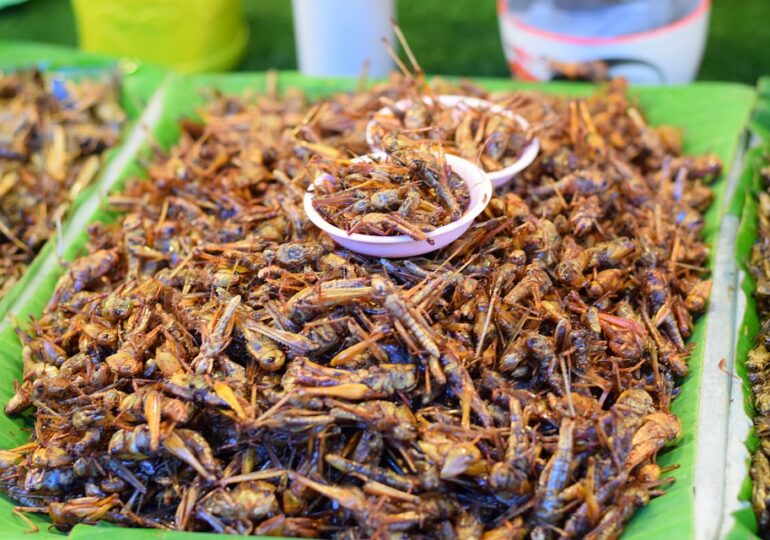Flour made from yellow mealworms, larvae of mealworm beetles (Tenebrio molitor), is, starting from February 10, an authorized food to be introduced to the European food market, according to a regulation issued by the European Commission on January 20, under the signature of President Ursula von der Leyen.
According to the EC regulation, UV-treated powder from whole larvae of „Tenebrio molitor” must be included in the list of new foods of the European Union provided for in Implementing Regulation (EU) 2017/2470.
The French company Nutri"Earth has exclusivity to introduce flour made from yellow mealworms to the market for the next five years, starting from February 10, 2025, according to the same mandatory regulation that applies directly in all member states.
What is "Novel Food"
The Commission provides a series of clarifications regarding the decision to approve another insect-derived food (the fourth one) as "Novel Food" to be used as a food ingredient in a range of food products intended for the European population.
The concept of "Novel Food" is defined as food that has not been significantly consumed by Europeans before May 15, 1997, when the first regulation on new foods was introduced. No member state has confirmed a significant level of human consumption of insects of any species before May 15, 1997.
According to the EC, the regulation adopted in January is one of the final steps in the authorization procedure for UV-treated flour from mealworms as a new food. Member states have given the green light to the Commission to allow a food sector operator, who has requested these authorizations, to introduce the product to the EU market - in this case, the French company Nutri"Earth.
This has already happened with a series of insects, such as migratory locusts or house crickets, and the legislation regulating the so-called "new foods" seeks to maintain a balance between innovation and food safety.
The current authorization regime has succeeded in halving the time required for "new foods" to reach the EU market compared to previous legislation, according to the Commission.
Various types of foods are considered, some completely unusual, such as insects, algae, new plant proteins, but also traditional dishes from third countries, and they will contribute to achieving the various objectives set by the EU within the Green Deal and the Farm to Fork strategy.
Conditions for using insects in food production
The principles that the Commission claims to protect under the new food regulations refer to the safety of new foods for consumption and the fact that they will be properly labeled on store shelves. Additionally, if the so-called new foods are intended to replace other foods, then they must have at least the same nutritional value as the ones they replace.
Regarding the consumption of insects, the Commission believes that it remains at the discretion of European citizens whether they want to eat insects or not, but specifies that using insects as an alternative source of protein is not new and adds that insects are regularly eaten in numerous regions around the world.
The European Commission further argues that diversifying the food supply with insect-based food positively contributes to the environment and health, while also responding to the increasing demand for proteins among the middle class, amid rising economic and environmental costs of animal protein production.
In addition, the EC argues that the ecological benefits of insect farming for food are based on the high feed conversion efficiency for insects, fewer greenhouse gas emissions, less water and arable land use, and the use of insect-based bioconversion as a solution to reduce food waste.
European market for "new foods" is expanding
The European Food Safety Authority (EFSA) considers the consumption of food based on yellow mealworms as "safe," but Italian Undersecretary for Health, Marcello Gemmato, stated that Italy will monitor this so that "the principle of transparency and citizens' right to fully choose consciously what they consume through labels and detailed information" is respected, as reported by the Italian news agency ANSA.
The agency notes that this decision by the EC has sparked controversy in the European Parliament, where Members of the European Parliament Alexander Bernhuber (EPP) and Laurence Trochu (CRE) tried to oppose this authorization by raising an objection to this act, which they consider "an insult to European farmers, but without success. The objection was rejected by the Environment Committee (ENVI) with a margin of just a few votes.
The European market for "new foods" is still underdeveloped, but it could soon expand by adding synthetic meat obtained in the laboratory - a request from the French start-up Gourmey to authorize the sale of lab-grown foie gras has been on the Commission's table since last summer.
Additionally, the World Economic Forum argues that insect-based foods can help combat climate change by offering alternative protein sources, as also highlighted by Polskie Radio (www.polskieradio.pl), adding that flour made from yellow mealworms will be used in a range of food products such as cheese, jams, pasta, and bread, provided that the larvae have been treated with UV radiation.
According to the Polish publication Rzeczpospolita, some Polish traders are already selling insect-based products, such as protein bars made from crickets and snacks containing mealworms. The Polish company HiProMine, which produces insect larvae for animal feed, is rapidly growing and expanding its operations, as noted by the newspaper Rzeczpospolita.

